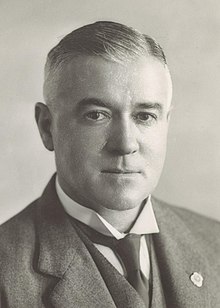Sir Charles Marr | |
|---|---|
 | |
| Minister for Repatriation | |
| In office 12 April 1932 – 12 October 1934 | |
| Prime Minister | Joseph Lyons |
| Preceded by | Charles Hawker |
| Succeeded by | Billy Hughes |
| Minister for Health | |
| In office 6 January 1932 – 12 October 1934 | |
| Prime Minister | Joseph Lyons |
| Preceded by | John McNeill |
| Succeeded by | Billy Hughes |
| Minister for Works and Railways | |
| In office 6 January 1932 – 12 April 1932 | |
| Prime Minister | Joseph Lyons |
| Preceded by | Albert Green |
| Succeeded by | Abolished |
| Minister for Home and Territories | |
| In office 2 April 1927 – 24 February 1928 | |
| Prime Minister | Stanley Bruce |
| Preceded by | William Glasgow |
| Succeeded by | Neville Howse |
| Member of the Australian Parliament for Parkes | |
| In office 31 January 1931 – 21 August 1943 | |
| Preceded by | Edward McTiernan |
| Succeeded by | Les Haylen |
| In office 13 December 1919 – 12 October 1929 | |
| Preceded by | Bruce Smith |
| Succeeded by | Edward McTiernan |
| Personal details | |
| Born | 23 March 1880 Petersham, New South Wales, Australia |
| Died | 20 October 1960 (aged 80) Pymble, New South Wales, Australia |
| Political party | Nationalist (to 1931) UAP (from 1931) |
| Spouse | Ethel May Ritchie |
| Education | Newington College Sydney Technical College |
| Occupation | Electrical engineer |
| Military service | |
| Allegiance | Australia |
| Branch/service | Australian Army |
| Years of service | 1898–c.1920s |
| Rank | Major |
| Battles/wars | First World War |
| Awards | Knight Commander of the Royal Victorian Order Distinguished Service Order Military Cross Mentioned in Despatches (2) |
Sir Charles William Clanan Marr KCVO, DSO, MC (23 March 1880 – 20 October 1960) was an Australian politician, engineer and soldier. He was a member of cabinet under prime ministers Stanley Bruce and Joseph Lyons, serving as Minister for Home and Territories (1927–1928), Works and Railways (1932), Health (1932–1934), and Repatriation (1932–1934). He was a member of the House of Representatives for over 20 years, representing the New South Wales seat of Parkes (1919–1929, 1931–1943). Prior to entering politics he was an officer with the Australian Imperial Force during World War I, winning the Distinguished Service Order and Military Cross for his service on the Mesopotamian campaign.